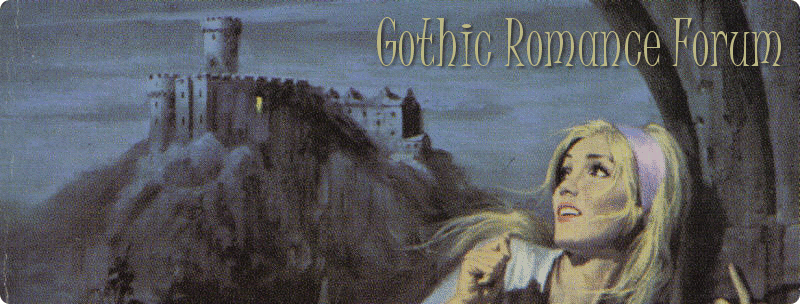09-23-2010, 12:10 AM
Contains no plot spoilers
Have you ever read a hitherto untried gothic author and found yourself suspiciously "listening" for a false note in the story?
Well in the book I'm reviewing the notes played true, and there was an authentic gothic feel, especially in the first half, yet somehow it never delivered that of which it seemed to be capable.
The story was not exactly masquerading as a gothic, but it certainly never lived up to the exalted claims on the back cover.(In fact, some of the information given there was just outright false).
The book begins mysteriously enough, and not without a certain allure.
There was definite atmosphere, an interesting time period (the 1600's), and a forbidding castle. The heroine was intelligent, reasonable in all her actions and plucky (She fights off an assailant single-handedly in a very well-described encounter). The author also had a way with words.
But somehow, in spite of these assets, it was disappointing. I'm not completely sure why, but I suspect it's partly because I don't like being lied to. "Wed to evil" the reader is told in the blurb. Also, "The husband she loved and trusted suddenly vanished and in his place was a stranger using her as a helpless pawn in a game of treachery and death." Slightly true, but very misleading. Trust me. Her husband was the nicest man you'd ever want to meet!
Taken as a whole, it was an acceptable gothic story, but the best compliment I can pay a book is to plan on some day re-reading it, and I don't think I will.
Have you ever read a hitherto untried gothic author and found yourself suspiciously "listening" for a false note in the story?
Well in the book I'm reviewing the notes played true, and there was an authentic gothic feel, especially in the first half, yet somehow it never delivered that of which it seemed to be capable.
The story was not exactly masquerading as a gothic, but it certainly never lived up to the exalted claims on the back cover.(In fact, some of the information given there was just outright false).
The book begins mysteriously enough, and not without a certain allure.
There was definite atmosphere, an interesting time period (the 1600's), and a forbidding castle. The heroine was intelligent, reasonable in all her actions and plucky (She fights off an assailant single-handedly in a very well-described encounter). The author also had a way with words.
But somehow, in spite of these assets, it was disappointing. I'm not completely sure why, but I suspect it's partly because I don't like being lied to. "Wed to evil" the reader is told in the blurb. Also, "The husband she loved and trusted suddenly vanished and in his place was a stranger using her as a helpless pawn in a game of treachery and death." Slightly true, but very misleading. Trust me. Her husband was the nicest man you'd ever want to meet!
Taken as a whole, it was an acceptable gothic story, but the best compliment I can pay a book is to plan on some day re-reading it, and I don't think I will.



